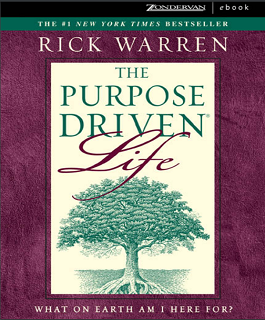Books by Shadrack Acquah
١٣ Books found
Finally Free
Authors: SH
Picture your life as a room. Beautiful hardwood floors are swept clean. Sunlight streams through windows. Photos of family and friends hang on the walls. The furniture is arranged just how you want it—for maximum usefulness and comfort. The room is peaceful. It’s just right. But in a corner hidden by shadows, in a tiny crack between two floorboards, a small, ugly weed has sprouted. The weed represents pornography. It’s so small. It’s easy to hide. You can cover it with a rug or chair. You can ignore it and downplay its significance. There are so many other good and beautiful things to enjoy in the room of your life. But the weed grows … and grows. Its thorny, twisted vines steadily spread across the floor and climb the walls. They wrap themselves around tables and chairs. They even grow over the windows—blocking out the sunlight. Now no part of your room is untouched. Everywhere you turn, the weed has invaded and is choking out life. You feel like a prisoner. I don’t know how big a problem pornography is for you. Maybe this weed has overtaken your life. Or maybe it’s just beginning to grow. If you’re like many people, you’ve tried to uproot it with little success. The problem is that too many of us use ineffective tools. Picture that tough, thorn-covered weed. And then imagine yourself trying to dislodge it with a plastic fork. A toothpick. A flimsy straw. These are the kinds of useless tools we’re working with when we try to change deeply rooted habits with mere willpower, personal resolutions, and self-centered, worldly sorrow. We need better tools. And that’s what Finally Free is all about.
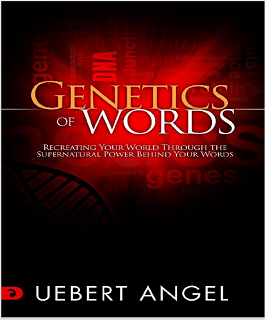
Genetics Of Words
Authors: SH
The God Symbiont Gene We have all seen him What if you discovered a genetic key that could unlock and transform your DNA and make you superhuman: a genetic code so explosive yet so simple that the power to prosperity, health, joy, happiness, and the prevention of diseases could be yours? What would you do with it? There is no need to wait anymore for there is evidence of an ancient art which geneticists and linguists are discovering, a whole new type of medicine in which the words of your mouth can influence DNA. Yes, they discovered that DNA can be improved and reprogrammed withoutcutting out and replacing single genes but by words proceeding out of your mouth and frequencies, creating exactly what your heart desires. I call this abilityThe God Symbiont Gene. It is this God gene that biblical giants like Joshua used to stop the Earth from rotating around the sun for what seemed like a whole day. This God gene caused Philip to appear in far and distant areas in seconds at speed far beyond the speed of light and even that of thought. It is the same genetic makeup Elijah used to part the waters of Jordan and cross it on dry ground. This is the power Jesus Christ used to walk on water as if it were concrete, ignoring the concepts of viscosity and shattering to pieces the laws of molecular density. This God Symbiont Gene is available for you and has been for years. It can make a mere human superhuman. It grants a person the ability to perform superhuman feats that will shock their world. Human strength like that of Eleazar son of Dodai the Ahohite recorded in biblical text is possible when one gets a hold of the secret of transforming their DNA using this coding as Eleazar did. He was one of the three mighty men who were with David when they taunted the Philistines gathered at Pas Dammim for battle. As the enemy advanced and the men of Israel retreated, Eleazar stood his ground and struck down an estimated one thousand Philistines singlehandedly. He fought until his hand grew tired and froze to the sword. By the time the troops returned, the only thing left for them to do was to strip the dead. Eleazar had already done all the fighting (see 2 Samuel 23:9–10). Another carrier of the God Symbiont Gene was Shammah son of Agee the Hararite. He stood his ground against a troop of Philistine soldiers who had banded together at a field full of lentils. The estimated number of soldiers in the troop is between eight hundred to one thousand. Israel’s troops fled from the Philistines, but Shammah took his stand in the middle of the field and defended it, striking the Philistines down by himself (2 Samuel 23:11– 12). We also have Benaiah, son of Jehoiada whose father was a valiant fighter from Kabzeel who performed great exploits. Benaiah struck down two of Moab’s best fighting men (1 Chronicles 11:22a). He also went down into a pit on a snowy day and killed a lion with one slap to its face (1 Chronicles 11:22b). Imagine killing a lion with your bare hands! And this was not just any lion. This was a lion that was trapped in a pit without food on a cold, snowy day, which increased the likelihood of the lion being even more hungry and aggresive. Suffice it to say that a hungry lion is a ferocious beast. The safest way to kill it would have been from above, but Benaiah went down into the pit, faced it head-on, and with one clap killed it with superhuman strength. The God Symbiont Gene was fully activated in these men!
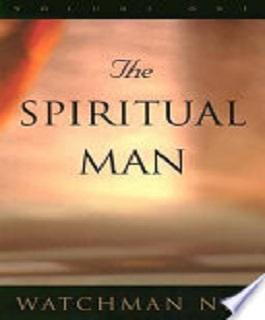
The spiritual man
Authors: SH
Spirit, Soul and Body The ordinary concept of the constitution of human beings is dualistic—soul and body. According to this concept soul is the invisible inner spiritual part, while body is the visible outer corporal part. Though there is some truth to this, it is nevertheless inaccurate. Such an opinion comes from fallen man, not from God; apart from God’s revelation, no concept is dependable. That the body is man’s outward sheath is undoubtedly correct, but the Bible never confuses spirit and soul as though they are the same. Not only are they different in terms; their very natures differ from each other. The Word of God does not divide man into the two parts of soul and body. It treats man, rather, as tripartite—spirit, soul and body. 1 Thessalonians 5.23 reads: “May the God of peace himself sanctify you wholly; and may your spirit and soul and body be kept sound and blameless at the coming of our Lord Jesus Christ.” This verse precisely shows that the whole man is divided into three parts. The Apostle Paul refers here to the complete sanctification of believers, “sanctify you wholly.” According to the Apostle, how is a person wholly sanctified? By his spirit and soul and body being kept. From this we can easily understand that the whole person comprises these three parts. This verse also makes a distinction between spirit and soul; otherwise, Paul would have said simply “your soul.” Since God has distinguished the human spirit from the human soul, we conclude that man is composed of not two, but three, parts: spirit, soul and body. Is it a matter of any consequence to divide spirit and soul? It is an issue of supreme importance for it affects tremendously the spiritual life of a believer. How can a believer understand spiritual life if he does not know what is the extent of the realm of the spirit? Without such understanding how can he grow spiritually? To fail to distinguish between spirit and soul is fatal to spiritual maturity. 26 The Spiritual Man Christians often account what is soulical as spiritual, and thus they remain in a soulish state and seek not what is really spiritual. How can we escape loss if we confuse what God has divided? Spiritual knowledge is very important to spiritual life. Let us add, however, that it is equally as, if not more, important for a believer to be humble and willing to accept the teaching of the Holy Spirit. If so, the Holy Spirit will grant him the experience of the dividing of spirit and soul, although he may not have too much knowledge concerning this truth. On the one hand, the most ignorant believer, without the slightest idea of the division of spirit and soul, may yet experience such a dividing in real life. On the other hand, the most informed believer, completely conversant with the truth concerning spirit and soul, may nonetheless have no experience of it. Far better is that person who may have both the knowledge and the experience. The majority, however, lack such experience. Consequently, it is well initially to lead these to know the different functions of spirit and soul and then to encourage them to seek what is spiritual. Other portions of the Scriptures make this same differentiation between spirit and soul. “For the word of God is living and active, sharper than any two-edged sword, piercing to the division of soul and spirit, of joints and marrow, and discerning the thoughts and intentions of the heart” (Heb. 4.12). The writer in this verse divides man’s non-corporal elements into two parts, “soul and spirit.” The corporal part is mentioned here as including the joints and marrow— organs of motion and sensation. When the priest uses the sword to cut and completely dissect the sacrifice, nothing inside can be hidden. Even joint and marrow are separated. In like manner the Lord Jesus uses the Word of God on His people to separate thoroughly, to pierce even to the division of the spiritual, the soulical, and the physical. And from this it follows that since soul and spirit can be divided, they must be different in nature. It is thus evident here that man is a composite of three parts. Spirit, Soul and Body 27 The Creation of Man “And Jehovah God formed man of dust from the ground, and breathed into his nostrils the breath of life; and man became a living soul” (Gen. 2.7 ASV). When God first created man He formed him of dust from the ground, and then breathed “the breath of life” into his nostrils. As soon as the breath of life, which became man’s spirit, came into contact with man’s body, the soul was produced. Hence the soul is the combination of man’s body and spirit. The Scriptures therefore call man “a living soul.” The breath of life became man’s spirit; that is, the principle of life within him. The Lord Jesus tells us “it is the spirit that gives life” (John 6.63). This breath of life comes from the Lord of Creation. However, we must not confuse man’s spirit with God’s Holy Spirit. The latter differs from our human spirit. Romans 8.16 demonstrates their difference by declaring that “it is the Spirit himself bearing witness with our spirit that we are children of God.” The original of the word “life” in “breath of life” is chay and is in the plural. This may refer to the fact that the inbreathing of God produced a twofold life, soulical and spiritual. When the inbreathing of God entered man’s body it became the spirit of man; but when the spirit reacted with the body the soul was produced. This explains the source of our spiritual and soulical lives. We must recognize, though, that this spirit is not God’s Own life, for “the breath of the Almighty gives me life” (Job 33.4). It is not the entrance of the untreated life of God into man, neither is it that life of God which we receive at regeneration. What we receive at new birth is God’s Own life as typified by the tree of life. But our human spirit, though permanently existing, is void of “eternal life.” “Formed man of dust from the ground” refers to man’s body; “breathed into his nostrils the breath of life” refers to man’s spirit as it came from God; and “man became a living soul” refers to man’s soul when the body was quickened by the spirit and brought into being a living and self-conscious man. A complete man is a trinity— the composite of spirit, soul and body. According to Genesis 2.7, 28 The Spiritual Man man was made up of only two independent elements, the corporeal and the spiritual; but when God placed the spirit within the casing of the earth, the soul was produced. The spirit of man touching the dead body produced the soul. The body apart from the spirit was dead, but with the spirit man was made alive. The organ thus animated was called the soul. “Man became a living soul” expresses not merely the fact that the combination of spirit and body produced the soul; it also suggests that spirit and body were completely merged in this soul. In other words, soul and body were combined with the spirit, and spirit and body were merged in the soul. Adam “in his unfallen state knew nothing of these ceaseless strivings of spirit and flesh which are matters of daily experience to us. There was a perfect blending of his three natures into one and the soul as the uniting medium became the cause of his individuality, of his existence as a distinct being.” (Pember’s Earth’s Earliest Age) Man was designated a living soul, for it was there that the spirit and body met and through which his individuality was known. Perhaps we may use an imperfect illustration: drop some dye into a cup of water. The dye and water will blend into a third substance called ink. In like manner the two independent elements of spirit and body combine to become living soul. (The analogy fails in that the soul produced by the combining of spirit and body becomes an independent, indissoluble element as much as the spirit and body.) God treated man’s soul as something unique. As the angels were created as spirits, so man was created predominantly as a living soul. Man not only had a body, a body with the breath of life; he became a living soul as well. Thus we find later in the Scriptures that God often referred to men as “souls.” Why? Because what the man is depends on how his soul is. His soul represents him and expresses his individuality. It is the organ of man’s free will, the organ in which spirit and body are completely merged. If man’s soul wills to obey God, it will allow the spirit to rule over the man as ordered by God. Spirit, Soul and Body 29 The soul, if it chooses, also can suppress the spirit and take some other delight as lord of the man. This trinity of spirit, soul and body may be partially illustrated by a light bulb. Within the bulb, which can represent the total man, there are electricity, light and wire. The spirit is like the electricity, the soul the light, and body the wire. Electricity is the cause of the light while light is the effect of electricity. Wire is the material substance for carrying the electricity as well as for manifesting the light. The combination of spirit and body produces soul, that which is unique to man. As electricity, carried by the wire, is expressed in light, so spirit acts upon the soul and the soul, in turn, expresses itself through the body. However, we must remember well that whereas the soul is the meeting-point of the elements of our being in this present life, the spirit will be the ruling power in our resurrection state. For the Bible tells us that “it is sown a physical body, it is raised a spiritual body” (1 Cor. 15.44). Yet here is a vital point: we who have been joined to the resurrected Lord can even now have our spirit rule over the whole being. We are not united to the first Adam who was made a living soul but to the last Adam Who is a life-giving spirit (v.45).
- Featured
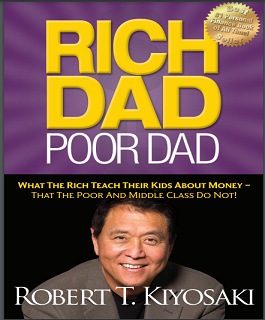
Rich Dad Poor Dad
Authors: Robert T. Kiyosaki
In Business and Finance, Finance and Investing
I had two fathers, a rich one and a poor one. One was highly educated and intelligent. He had a Ph.D. and completed four years of undergraduate work in less than two years. He then went on to Stanford University, the University of Chicago, and Northwestern University to do his advanced studies, all on full financial scholarships. The other father never finished the eighth grade. Both men were successful in their careers, working hard all their lives. Both earned substantial incomes. Yet one always struggled financially. The other would become one of the richest men in Hawaii. One died leaving tens of millions of dollars to his family, charities, and his church. The other left bills to be paid. Both men were strong, charismatic, and influential. Both men offered me advice, but they did not advise the same things. Both men believed strongly in education but did not recommend the same course of study. If I had had only one dad, I would have had to accept or reject his advice. Having two dads offered me the choice of contrasting points of view: one of a rich man and one of a poor man. Instead of simply accepting or rejecting one or the other, I found myself thinking more, comparing, and then choosing for myself. The problem was that the rich man was not rich yet, and the poor man Introduction 2 was not yet poor. Both were just starting out on their careers, and both were struggling with money and families. But they had very different points of view about money. For example, one dad would say, “The love of money is the root of all evil.” The other said, “The lack of money is the root of all evil.” As a young boy, having two strong fathers both influencing me was difficult. I wanted to be a good son and listen, but the two fathers did not say the same things. The contrast in their points of view, particularly about money, was so extreme that I grew curious and intrigued. I began to start thinking for long periods of time about what each was saying. Much of my private time was spent reflecting, asking myself questions such as, “Why does he say that?” and then asking the same question of the other dad’s statement. It would have been much easier to simply say, “Yeah, he’s right. I agree with that.” Or to simply reject the point of view by saying, “The old man doesn’t know what he’s talking about.” Instead, having two dads whom I loved forced me to think and ultimately choose a way of thinking for myself. As a process, choosing for myself turned out to be much more valuable in the long run than simply accepting or rejecting a single point of view. One of the reasons the rich get richer, the poor get poorer, and the middle class struggles in debt is that the subject of money is taught at home, not in school. Most of us learn about money from our parents. So what can poor parents tell their child about money? They simply say, “Stay in school and study hard.” The child may graduate with excellent grades, but with a poor person’s financial programming and mindset. Sadly, money is not taught in schools. Schools focus on scholastic and professional skills, but not on financial skills. This explains how smart bankers, doctors, and accountants who earned excellent grades may struggle financially all of their lives. Our staggering national debt is due in large part to highly educated politicians and government officials making financial decisions with little or no training in the subject of money
- Featured
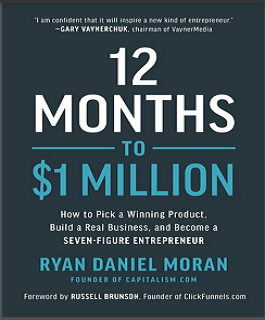
12 Months to $1 Million
Authors: Russel Brussen
Y FOREWORD ou’re one funnel away.” These words are my promise to entrepreneurs. My name is Russell Brunson, and I lead a community of entrepreneurs who build simple and profitable businesses. We call ourselves “funnel hackers.” I have personally seen thousands of women and men create businesses with nothing more than an idea and a drive to succeed. To date, we have more than 600 community members in our “two-comma club”—individuals who sold at least a million dollars on our software platform, ClickFunnels. None of us come with silver spoons in our mouths. We don’t have big teams, and we don’t cheat by raising money from venture capital firms; if anyone does invest in us, it is usually a few thousand dollars from someone who believed in our crazy dreams. We don’t begin with unique skills or previous experience. We don’t come from families of business moguls. We are simply passionate business builders who can’t do anything except be entrepreneurs. Why? Because above else, we desire freedom. We desire the freedom to give more to our families, our communities, and our churches, and we desire to leave the world better than how we found it. We desire the freedom to give our kids the advantages that we did not have. We desire the freedom to see the world and live life on our own terms. I believe that every person is one funnel, one idea, or one breakthrough away from their version of freedom. You are one funnel away from the life that you want.
- Featured
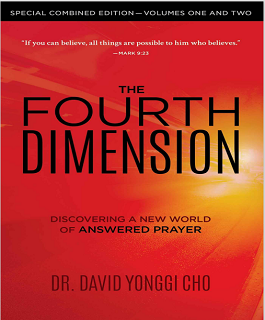
The Fourth Dimension
Authors: Dr. David Yongi Cho
ncubation: A Law of Faith God will never bring about any of His great works without coming through your own personal faith. It is taken for granted that you have faith, for the Bible says that God has dealt to each and every one of us a measure of faith. You have faith whether you feel it or not. You may try to feel faith, but when you need faith, then faith is there. It is there for your use, like having two arms; when you need to use them, you just reach out your arms and move them. I do not need to feel that my two arms are hanging on my shoulders to know that I have them. There are, however, certain ways your faith works, and links you to the Heavenly Father who dwells within you. The Bible says that faith is the substance of things hoped for, a substance which first has a stage of development—of incubation—before its usage can be full and effective. You might now ask, “What are the elements needed to make my faith usable?” There are four basic steps to the process of incubation.
- Featured
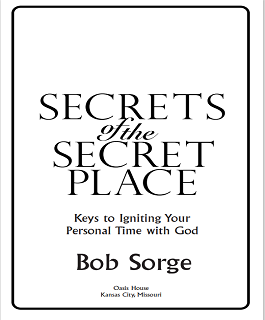
Secret of The Secret place
Authors: Bob Sorge
“But you, when you pray, go into your room, and when you have shut your door, pray to your Father who is in the secret place; and your Father who sees in secret will reward you openly” (Matthew 6:6). J esus Himself spoke these blessed words. All Scripture is God-breathed, but followers of Jesus always find special delight in giving particular attention the words Jesus Himself gave us. When Jesus taught on prayer, He gave primary emphasis to the secret place. In fact, the first thing He taught concerning prayer was the primacy of the secret place. In the verses following, He would teach us how to pray, but first He teaches where to pray. Matthew 6:6 contains a powerful secret regarding the where of prayer, but before I share it let me ask a question. Do you struggle frequently with feeling disconnected from God? Do you strain to feel God’s presence when you pray? Does He seem distant to you? Do you long to know that He is with you, right now, drawing near to you?
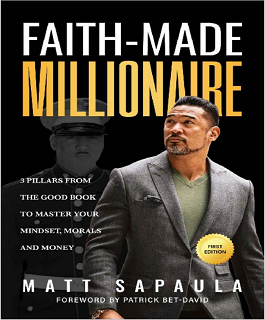
Faith-Made Millionaire
Authors: Matt Sapaula
In Business and Finance, Economics, Spiritual-Faith
PILLAR I FAITH & FAMILY “The greatest legacy one can pass on to one’s children, and grandchildren is not money or other material things accumulated in one’s life, but rather a legacy of character and faith.” — Billy Graham E 1 Misconceptions of Faith “Faith is to believe what you do not see. The reward of faith is to see what you believe.” — Saint Augustine very human being lives by faith. Even someone who doesn’t believe in a God or a Higher Power believes in science. They put their trust in hypotheses advanced by non-religious scientists with regard to the origin of the universe and questions of ultimate meaning. Since these are things they cannot scientifically verify, they essentially learned from others they consider authoritative. Hebrews, chapter eleven in the Bible has often been called “The Faith Chapter.” It describes many of God’s greatest servants and how their faith enabled them to perform great acts and miracles and endure severe trials. This chapter says, “Now faith is the substance of things hoped for, the evidence of things not seen” (Hebrews 11:1, emphasis added). Faith involves evidence of things not seen, but how can evidence be related to something unseen since evidence usually involves tangible things? In a courtroom, evidence involves facts—and anything that isn’t seen—is hearsay. Faith involves assurance of things we hope for, but if something is hoped for, that means it hasn’t been received yet. Therefore, where faith is involved, there is an assurance that it will be received! Authentic faith, in any of God’s promises, is actually the evidence. If God promises to do something, it is impossible for Him to lie (Hebrews 6:18). Faith, by its very nature, produces action. We are wired to feel and act in accordance with what we believe to be true. We cannot help it. Faith is knowing what needs to be done without feeling prepared to make a decision. You don’t have the skills or know what the end result will be, but you know there’s a Higher Power that is seeing things through. For years, I misunderstood faith. I used my faith in God as armor or insurance policy because I was either scared or looking for another layer of protection like I did in the military. I wanted eternal security just in case something happened to me. I convinced myself that I was pleasing God, while in fact, God wanted me to use faith in my everyday life, not when I was about to cross into eternity. If beliefs about God and faith abound, then misguided misconceptions about faith in Him also exist. I won’t attempt to dispel every misconception about faith because that would take too long. I will share, however, some of the most common false beliefs we can hold regarding faith. Misconception: God isn’t concerned about money. Truth: God cares about you and your money. Some people believe God cares more about their heart and spirit versus what they do with their money. He actually cares about both. Half of Jesus’ parables instruct people on how to handle earthly treasures. One out of ten verses in the four gospels deals with money and stewardship. Are you convinced yet? God taught more about stewardship than about Heaven and Hell combined! Why in the world would God spend so much time on this topic if it wasn’t necessary? Money is a training ground for God to develop (and for us to discover) our trustworthiness. “If therefore you have not been faithful in the use of unrighteous mammon, who will entrust the true riches to you?” (Luke 16:11). Billy Graham once said, “You tell me what you think about money, and I will tell you what you think about God.” If you look at your checkbook or financial records, you will see where your heart is. Money reveals the condition of our hearts, and how we deal with it shows how much we give over to our Lord versus how much we hold back.


